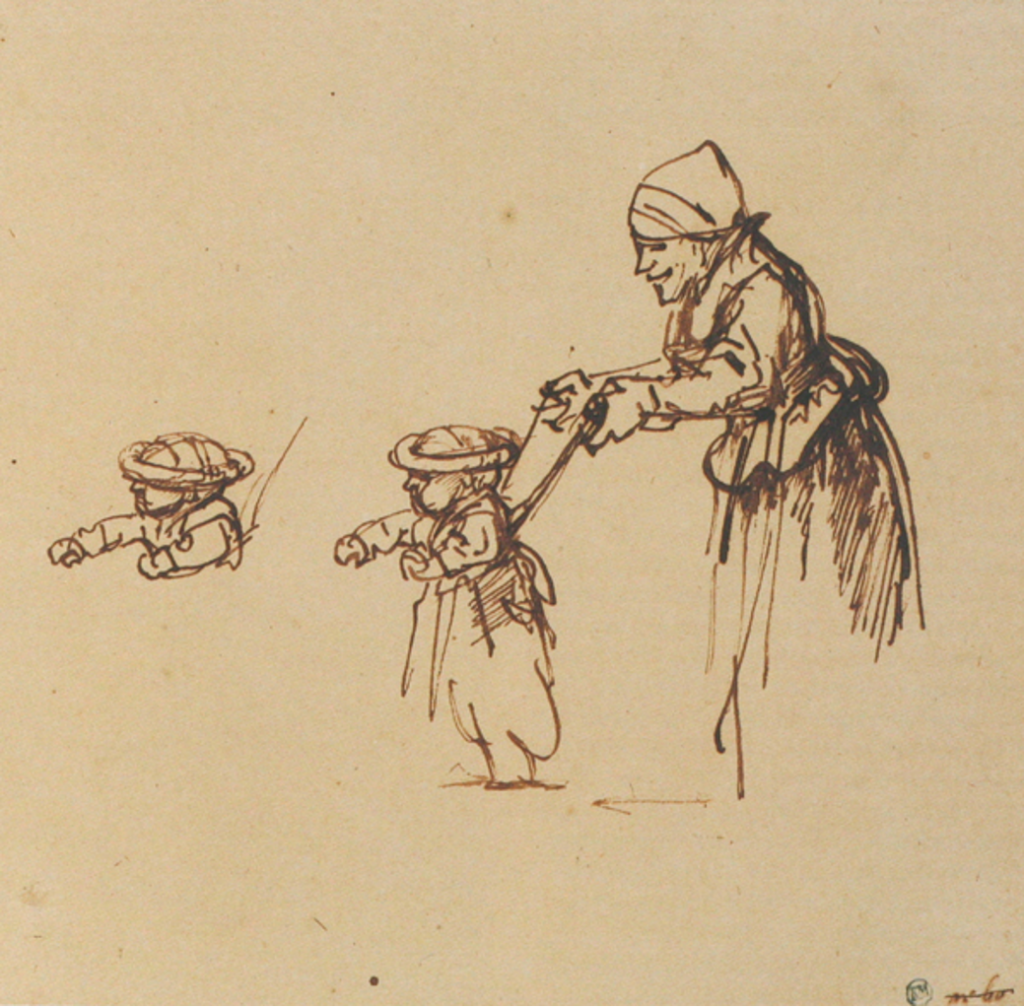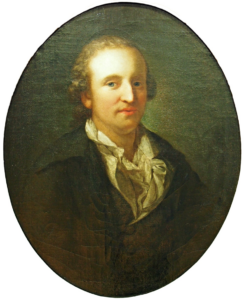Morning song
(Poet's title: Morgenlied)
Set by Schubert:
D 266
[August 24, 1815]
Willkommen, rotes Morgenlicht!
Es grüßet dich mein Geist,
Der durch des Schlafes Hülle bricht
Und seinen Schöpfer preist.
Willkommen, goldner Morgenstrahl,
Der schon den Berg begrüßt
Und bald im stillen Quellental
Die kleine Blume küsst!
O Sonne, sei mir Gottes Bild,
Der täglich dich erneut,
Der immer hehr, und immer mild,
Die ganze Welt erfreut.
Der, wie die Blum’ im Quellental,
O Sonne, dich erschuf,
Als deine Schwestern allzumal
Entflammten seinem Ruf.
Ihr wandelt auf bestimmter Bahn
Einher und strauchelt nicht;
Denn Gottes Odem haucht euch an,
Sein Aug’ ist euer Licht.
Er leitet euch am Gängelband,
Heil mir! Er führt auch mich!
Er, der Orions Gürtel band,
Verband auch mich mit sich!
Er leitet jeden, der ihm traut,
Mit unsichtbarer Hand,
Als wär er nur ihm anvertraut,
An seinem Gängelband!
Die Sonne steiget! Weib und Kind
Erwacht! erwacht wie sie!
Erwachet! werfen wir geschwind
Uns alle hin auf’s Knie!
Und dann zur Tagesarbeit, frisch!
Sein Segen leuchtet hell!
Der Herr bereitet unsern Tisch,
Uns quillt der Freude Quell!
Uns strahlet Gottes Herrlichkeit
Auch aus der Unsern Gruft;
Wir wissen, wer zur Seligkeit
Sie rief und bald uns ruft!
Dem sind auch seine Toten nah,
Wer Gott, den Herren, preist
Und freudig im Halleluja
Sich dieser Welt entreißt.
Welcome, red light of morning!
My spirit greets you,
Breaking through the cover of sleep
And praising its creator.
Welcome, golden ray of morning,
Which is already greeting the mountain,
And which, in the quiet valley with the spring, will soon
Be kissing the small flower!
Oh sun, be the image of God for me,
He who renews you every day,
Always sublime and always gentle,
Bringing joy to the whole world.
He who, like the flower in the valley with the spring
Created you, oh sun,
When all your sisters at the same time
Were set ablaze at his command.
You follow a prescribed course
Moving along without stumbling;
For the breath of God breathes on you,
It is his eye that is your light.
He keeps you on a tight rein,
Which bodes well for me! He is also leading me!
He who tied Orion’s belt
Also tied me up with himself!
He guides everyone who trusts him
With an invisible hand,
As if he were the only one entrusted
To his reins!
The sun is climbing! Women and children,
Wake up! Wake up like them!
Wake up! let us immediately throw
Ourselves down onto our knees!
And then, fresh, onto our day’s work,
His blessing shines bright!
The Lord is preparing our table.
The source of joy is welling up for us!
God’s Lordship is shining onto us,
Even from our tomb;
We know who the grave has called to happiness
And that it will soon call us!
Its dead are also close to God’s Lordship,
Those who extol the Lord God
And joyfully, with a Halleluja,
Cut themselves off from this world.
All translations into English that appear on this website, unless otherwise stated, are by Malcolm Wren. You are free to use them on condition that you acknowledge Malcolm Wren as the translator and schubertsong.uk as the source. Unless otherwise stated, the comments and essays that appear after the texts and translations are by Malcolm Wren and are © Copyright.
☙
Themes and images in this text:
Breath and breathing Climbing Covers and covering Eyes Fire Flowers Gold Graves and burials Hands Joy Kissing Leading and directing Light Morning and morning songs Mountains and cliffs Pictures and paintings Rays of light Red and purple Sleep Springs, sources and fountains Stars The sun Valleys Waking up
For many 18th century poets the setting sun does not just elicit thoughts about death and transience, but also the prospect of a new day and resurrection to a new life. Similarly Stolberg-Stolberg’s address to the morning concludes with a reminder that the grave is not far away and that the happiness of the day that is dawning is nothing in comparison to the bliss in store in the afterlife. The speaker decides to look at the rising sun as an image of God, bringing new life to the whole world just as he will raise the dead to a new day.
The rising sun, travelling in its fixed course, makes the poet think of the fourth day of creation (according to Genesis), when its ‘sisters’ (the stars) were similarly set ablaze at God’s command:
And God said, Let there be lights in the firmament of the heaven to give light upon the earth: and it was so. And God made two great lights; the greater to rule the day, and the lesser to rule the night: he made the stars also. And God set them in the firmament of the heaven, to give light upon the earth, And to rule over the day and over the night, and to divide the light from the darkness: and God saw that it was good. And the evening and the morning were the fourth day.
(Genesis 1: 14-19 King James Version)
The light that is breaking through at dawn is therefore God’s own light, since he created it, and the light of the sun and the stars actually comes from the eye of God (the celestial bodies were often seen as eyes, which were frequently thought to emit light themselves).
The sunrise thus reminds us that God is ‘keeping an eye on’ us. The poet then uses a related image of supervision and paternalism: holding on to a toddler’s reins. Just as he tied Orion’s belt, he has tied us into a harness and is holding on to the reins to ensure that we do not stray too far. If we trust him we can be sure that his invisible hand will guide and protect us.

Nationalmuseum, Stockholm
☙
Original Spelling Morgenlied Willkommen, rothes Morgenlicht! Es grüßet dich mein Geist, Der durch des Schlafes Hülle bricht, Und seinen Schöpfer preis´t. Willkommen, goldner Morgenstrahl, Der schon den Berg begrüßt, Und bald im stillen Quellenthal Die kleine Blume küßt! O Sonne, sei mir Gottes Bild, Der täglich dich erneut, Der immer hehr, und immer mild, Die ganze Welt erfreut. Der, wie die Blum' im Quellenthal, O Sonne, dich erschuf, Als deine Schwestern allzumal Entflammten seinem Ruf. Ihr wandelt auf bestimmter Bahn Einher und strauchelt nicht; Denn Gottes Odem haucht euch an, Sein Aug' ist euer Licht. Er leitet euch am Gängelband, Heil mir! Er führt auch mich! Er, der Orions Gürtel band, Verband auch mich mit sich! Er leitet jeden, der ihm traut, Mit unsichtbarer Hand, Als wär´ er nur ihm anvertraut, An seinem Gängelband! Die Sonne steiget! Weib und Kind Erwacht! erwacht wie sie Erwachet! werfen wir geschwind Uns alle hin auf's Knie! Und dann zur Tagesarbeit, frisch, Sein Segen leuchtet hell! Der Herr bereitet unsern Tisch. Uns quillt der Freude Quell! Uns strahlet Gottes Herrlichkeit Auch aus der Unsern Gruft; Wir wissen, wer zur Seligkeit Sie rief, und bald uns ruft! Dem sind auch seine Todten nah´, Wer Gott, den Herren, preis´t, Und freudig im Halleluja Sich dieser Welt entreißt.
Confirmed by Peter Rastl with Gedichte der Brüder Christian und Friedrich Leopold Grafen zu Stolberg. Zweiter Theil. Wien, 1821. Im Verlage bei J.B. Wallishausser. Hamburg, bei Perthes und Besser, pages 113-115; and with Musen-Almanach fürs Jahr 1795.Herausgegeben von Johann Heinrich Voß. Hamburg bei Carl Ernst Bohn, pages 68-70.
To see an early edition of the text, go to page 157 [169 von 354] here: http://digital.onb.ac.at/OnbViewer/viewer.faces?doc=ABO_%2BZ160626701


